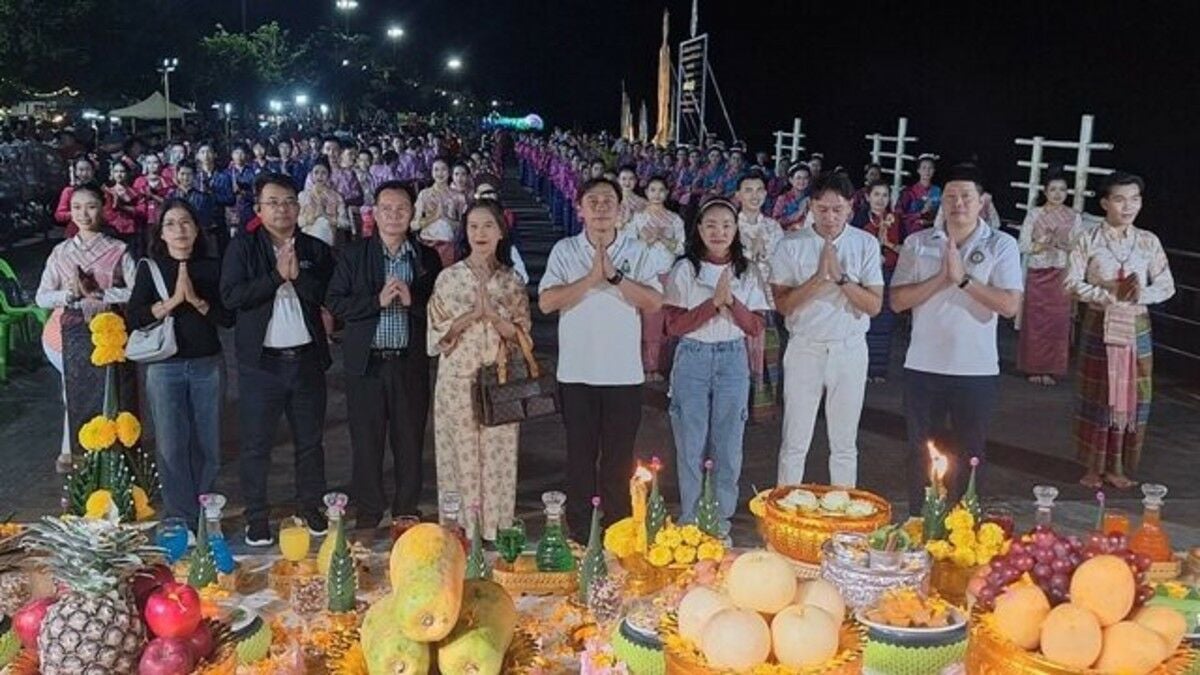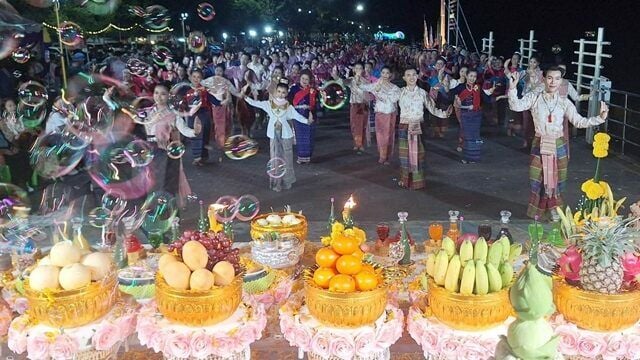Nakhon Phanom ritual sparks lottery hope with lucky number

A religious ceremony was recently held at the Phaya Nak landmark along the Mekong River in Nakhon Phanom province in search of a lucky number for the upcoming lottery draw.
A group of devotees from Bangkok recently conducted a significant ritual in honour of Phaya Srisattanakharat, or Grandfather Phaya Nak, aiming to invoke prosperity, fortune, and success in careers and finances.
The event, which marked its fifth occurrence, involved more than 100 dancers from local schools performing traditional dances as part of the religious proceedings.
The sight of the three-digit number 472 appearing on the ceremonial incense stick during the event added an unexpected thrill for participants, many of whom now hope for luck in the upcoming lottery draw.
The ceremony, which took place yesterday, December 12, saw the hosts generously distributing essential goods. They handed out 500 bags of rice, each weighing 5 kilogrammes, and 6,000 eggs to attendees.
Residents queued in long lines to receive these donations, which were given out in sets that included rice, eggs, and canned fish. These distributions were part of the ceremony’s charitable aspect, aimed at supporting the elderly and underprivileged in the community who had gathered since 3pm.
The ritual began with Non Nawathorn Nonkhamwong, a well-known Brahmin at the Nak landmark, leading the ceremony. He performed the sacred reading, invoking deities from the 16 heavens, 15 earth layers, and 14 underworld levels, as well as divine beings and serpent deities from the Mekong River to participate in the ceremony.
Following these rites, the participants, dressed in traditional attire representing eight ethnic groups, performed dances alongside the hosts. As the ritual concluded, the rice, eggs, and other food items were distributed to the public.
“Seeing the number 472 on the incense stick was a moment of astonishment for many attendees. It’s a sign of potential luck, and many are eager to see if it will bring them fortune in the lottery draw scheduled for December 16.”
The hosts also prepared an elaborate offering table for the ceremony, which included a seven-headed Phaya Nak throne, flower arrangements, fruits, sweets, and nine kinds of holy water.
The event’s scale was impressive, and the offerings were carefully arranged to honour the deities and Grandfather Phaya Nak.
After the ceremony, additional rice and canned fish were also shared with the student dancers who took part in the event, further spreading the blessings of abundance, reported KhaoSod.

Frequently Asked Questions
Here are some common questions asked about this news.
Why do rituals like the Phaya Nak ceremony continue to hold such significance in modern Thai society?
They blend cultural heritage with spiritual beliefs, offering hope, community support, and a sense of shared identity.
How might the appearance of a specific number during a ceremony influence people’s perceptions and actions?
Such occurrences are seen as omens, potentially affecting decisions, like participating in lottery draws, due to cultural beliefs in luck.
What if ceremonies like this one didn’t incorporate charitable acts like distributing food—how would that impact their perception?
The absence of charity might diminish community support and reduce the perceived communal benefit, possibly affecting attendance and participation.
What role do traditional dances play in enhancing the spiritual atmosphere of religious ceremonies?
They embody cultural expression, connecting participants to their heritage and enhancing spiritual engagement through symbolic movement.
How does the involvement of diverse ethnic groups in such ceremonies influence cultural cohesion?
It fosters inclusivity and mutual respect, promoting a unified cultural identity while celebrating diversity.
Latest Thailand News
Follow The Thaiger on Google News:


























